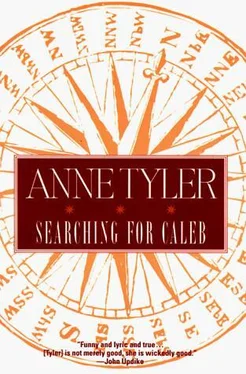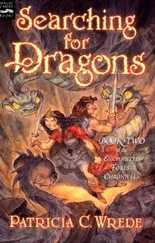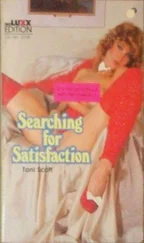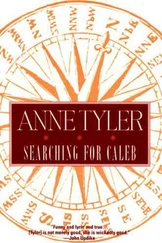Anne Tyler - Searching for Caleb
Здесь есть возможность читать онлайн «Anne Tyler - Searching for Caleb» весь текст электронной книги совершенно бесплатно (целиком полную версию без сокращений). В некоторых случаях можно слушать аудио, скачать через торрент в формате fb2 и присутствует краткое содержание. Жанр: Современная проза, на английском языке. Описание произведения, (предисловие) а так же отзывы посетителей доступны на портале библиотеки ЛибКат.
- Название:Searching for Caleb
- Автор:
- Жанр:
- Год:неизвестен
- ISBN:нет данных
- Рейтинг книги:5 / 5. Голосов: 1
-
Избранное:Добавить в избранное
- Отзывы:
-
Ваша оценка:
- 100
- 1
- 2
- 3
- 4
- 5
Searching for Caleb: краткое содержание, описание и аннотация
Предлагаем к чтению аннотацию, описание, краткое содержание или предисловие (зависит от того, что написал сам автор книги «Searching for Caleb»). Если вы не нашли необходимую информацию о книге — напишите в комментариях, мы постараемся отыскать её.
Searching for Caleb — читать онлайн бесплатно полную книгу (весь текст) целиком
Ниже представлен текст книги, разбитый по страницам. Система сохранения места последней прочитанной страницы, позволяет с удобством читать онлайн бесплатно книгу «Searching for Caleb», без необходимости каждый раз заново искать на чём Вы остановились. Поставьте закладку, и сможете в любой момент перейти на страницу, на которой закончили чтение.
Интервал:
Закладка:
The fact was that Caleb was pretty much a custom chef by now. He had known his few patrons a very long time, and since he was not a man who easily showed his liking for people he chose to cook them their favorite foods instead-the comfort foods that every man turns to when he is feeling low. For Jim Bolt it was hot milk and whisky; for old Emmett Gray, fried garden-fresh tomatoes with just a sprinkle of sugar; and Mr.
Ebsen the freight agent liked home-baked bread. The narrow aluminum shelves behind the counter, meant to hold only dry cereals, potato chips, and Hostess cream-filled cupcakes, were a jumble of condiments in Mason jars and Twinings tea from England, Scotch oatmeal tins, Old Bay crab spice, and Major Grey chutney. The cafe appeared, in fact, to be a kitchen in the home of a very large family. It had looked that way for years, but this was the first time Luray noticed. "What kind of a business is this?" she asked. "Do you want to send us all to the poorhouse? Here am I with these two growing babies and lying awake at night just wondering will we manage and there you are cooking up French omelettes and rice pudding, things not even on the menu and I don't even want to know how much you're charging for them . . ."
Luray took over his job, whipping an apron around her little tiny waist.
She acted as if she thought Caleb had grown weak in the head. She sent him up to tend the babies. Caleb had never been good with children. The sight of them made him wretched; he was so sorry for humans in the state of childhood that he couldn't stand to be near them. When one of the babies cried his insides knotted up and he felt bleak and hopeless. So he tended them as if from a distance, holding himself aloof, and as soon as it was nap time he hurried downstairs to socialize with the customers. He sat turning on a stool, talking and laughing, a little silly with relief, plunking down money from his own pocket to pay for a cup of coffee so Luray wouldn't send him off. He would fish out his harmonica with stiff, thickened fingers and give the men "Shut House" or
"Whisky Alley." Till Luray stopped in front of him with her hands on her hips and her head cocked. "Hear that? Hear what I hear? Hear them babies crying?" Then Caleb put away his harmonica and went back upstairs on slow, heavy feet.
In the fall of 1966, Luray found out she was pregnant again. She was not very happy about it. Money seemed scarcer than ever, the twins were getting to be a handful, and already the apartment was cramped. Caleb slept on the couch now, and the babies were in his old room. When he got up in the night he stumbled over blocks and wheeled toys and cold soggy diapers all the way to the bathroom, where likely as not Luray had shut herself in ahead of him. "Go away!" she would shout. "Go back to bed, you old skunk!"
One morning she went out all dressed up, leaving Roy to tend the cafe and Caleb to mind the babies. When she came back she told Caleb she had found him a place to move into. "Oh! Well," Caleb said.
He had thought a couple of times himself about moving, but not so concretely. And then there was the money. "This cafe just can't support two apartments, Luray," he said.
"It's not an apartment."
"Oh, a room? Well, fine, that'll be-"
"This is a place the county helps out with."
Then she flashed Roy a sudden look, and Roy hung his head in that bashful way he had and his face got red. But still Caleb didn't understand.
He understood only when they deposited him in the gray brick building with the concrete yard, with attendants squeaking in their rubber-soled shoes down the corridors. "But-Luray?" he said. Roy wandered off and looked at a bulletin board. The back of his neck was splotchy. Only Luray was willing to face Caleb. "Now you know they'll take good care of you," she told him. "Well, after all. It's not like you were any real relation or anything." She was balancing a baby on each arm, standing sway-backed against their weight-a thin, enormously pregnant woman with washed-out hair and cloudy skin. What could he say to her? There was no way he could even be angry, she was so dismal and pathetic. "Well," he said. "Never mind."
Though later, when the nurse told him he couldn't keep his harmonica here, he did feel one flash of rage that shook him from head to foot and he wondered if he would be able to stand it after all.
Now, he had to hum to make his music. Unfortunately he had a rather flat, toneless voice, and a tendency to hit the notes smack dab instead of slithering around on them as White-Eye Ramford used to. Still, it was better than nothing. And as time went by he made a few acquaintances, discovered a dogwood tree in the concrete yard, and began to enjoy the steady rhythm of bed, meals, social hour, nap. He had always liked to think that he could get along anywhere. Also he did have visitors. Some of these old men had no one. He had Roy and Luray coming by once a month or more with their four little tow-headed boys-Roy as young as ever, somehow, Luray dried and hollowed out. But she was very kind now. When the clock struck four and the matron shooed them from the visitors' parlor Luray would reach forward to touch Caleb's hand, or sometimes peck his cheek. "Now we'll be coming back, you hear?" she said. She always said, "Don't see us out, you sit right where you're at and stay comfortable." But he came anyway, out the steel door and across the concrete yard, to where the gate would clang shut in his face. He would wave through the grille, and Luray would tell her boys to wave back. And maybe halfway up the street, heading toward the bus stop, she would turn to smile and her chin would lift just as it used to, as if she were letting him know that underneath, she was still that sweet perky Luray Spivey and she felt just as bewildered as he did by the way things had worked out.
In his patched vinyl chair in the social room he hummed old snatches of song, joyous mournful chants for St. Louis and East St. Louis, Memphis and Beale Street, Pratt City and Parchman Farm, But it was a fact that he never hummed the "Stringtail Blues" at all, though White-Eye Ramford sang it continually in the echoing streets of his mind:
Once I walk proud, once I prance up and down, Now I holds to a string and they leads me around . . .
The morning the letter came he had been sitting like this in the social room. He remembered that when the attendant tossed the envelope into his lap he had expected a good half hour, perhaps, of studying pictures of floral arrangements. (Altona Florists were his only correspondents.) Bouquets named "Remembrance," "Friendly Thoughts," and "Elegance," which you could send clear across the continent without ever setting foot in a shop. But when he ripped open the envelope what he found instead was a typewritten letter of some sort. He checked the outside address. Mr.
Caleb Peck, yes. All the postmark said was "U.S. Postal Service Md."
Whatever had happened to postmarks?
Maryland.
He shook the letter open. "Dear Caleb," he read He skipped to the signature. "Your brother, Daniel J. Peck, S," A stone seemed to drop on his chest. But he was glad of course, that his brother was still alive.
He remembered Daniel with affection, and there were certain flashing images that could touch him even now, if he allowed them to-Daniel's yellow head bent over a schoolbook; the brave, scared look he sometimes gave his father; the embarrassed pride on his face when Maggie Rose came down the aisle in her wedding dress. Yet Caleb shrank in his vinyl chair, and glanced about the room as if checking for intruders. Then he read the rest of the letter.
It seemed that Daniel was inviting him to pay a visit. He was asking him to come to a place called Caro Mill. Caleb had never heard of Caro Mill.
He found it difficult to imagine his brother anywhere but Baltimore. And when he pictured accepting the invitation he pictured Baltimore still, even with this letter before him-a streetcar rattling toward the sandy, shaded roads of Roland Park, a house with cloth dolls and hobbyhorses scattered across the lawn. Daniel descending the steps to welcome him, smiling with those clear, level eyes that tended to squint a little as if dazzled by their own blueness. Caleb smiled back, nodding gently. Then he started and returned to the letter.
Читать дальшеИнтервал:
Закладка:
Похожие книги на «Searching for Caleb»
Представляем Вашему вниманию похожие книги на «Searching for Caleb» списком для выбора. Мы отобрали схожую по названию и смыслу литературу в надежде предоставить читателям больше вариантов отыскать новые, интересные, ещё непрочитанные произведения.
Обсуждение, отзывы о книге «Searching for Caleb» и просто собственные мнения читателей. Оставьте ваши комментарии, напишите, что Вы думаете о произведении, его смысле или главных героях. Укажите что конкретно понравилось, а что нет, и почему Вы так считаете.












